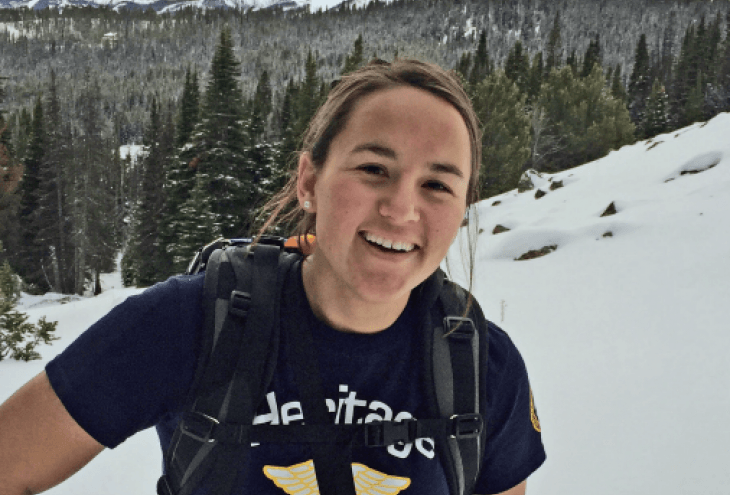High school should be a time of growth and self-discovery, and it was especially transformative for Amanda Carroll, Peguis First Nation and Cree. As a high school student she discovered both her cultural roots and her professional path.
Born in Bozeman, Mont., Carroll is the oldest of six children. She is proud of her Peguis and Cree heritage, but didn’t always feel connected with her tribe the way she does today. Growing up, she didn’t hear the Peguis language spoken at home, nor did she learn about their traditions.
Although there is a large indigenous population in Montana, Carroll felt slightly out of place because she was from a different tribe than her peers; after all, she was a long way from the Canadian homeland of the Peguis First Nation. She felt much more comfortable talking about her Native background when she visited Canada than she did in her hometown.
That all changed when Carroll became a high school student and began developing an interest in her family background. “I realized that this is something that is part of me, and I don’t want to hide it,” she explains. “So I started claiming it, learning more about my heritage, and becoming proud of who the Peguis are and who the Cree are.”
When Carroll asked her mother why she and her siblings hadn’t been taught more of the Peguis language, she learned that her grandparents hadn’t passed the language down to their children. “My grandparents grew up in the assimilation culture. They basically got their hands slapped when they would speak their native tongue, so they just stopped speaking it altogether,” Carroll says. “They didn’t want their kids to go through that.”
Carroll’s mother helped her register as a member of the Peguis First Nation. Since then, Carroll has enjoyed connecting with her tribe. “I have such a support system. There are just some phenomenal people up there,” she says. “They helped me out through my schooling, and any time I have questions, they answer what they can. There’s a definite family up there, which is great.”
As a member of a Canadian tribe, Carroll wasn’t eligible for many of the financial aid options available to Native Americans from U.S.-based tribes. Fortunately, the Peguis had her covered — they awarded her a merit-based scholarship, which she has used to pursue her true passion: biology.
That passion was awakened in her 10th-grade biology class in one of those small, seemingly inconsequential moments that can have a huge impact on a person’s future. “We were watching this video about wolf packs — how they move, how they’ll fight, and how the wolf that loses is ostracized from the pack — and I was just eating it up,” she recalls. “At that point, I realized that biology might be for me.”
When it was time to find the right college, Carroll had a few things to take into account. “I liked learning about how the organism is affected by its environment, how it affects the environment, and how things on the inside can affect it,” she explains. But she ultimately wanted to work in the medical field, so she decided to pursue a BS in organismal biology at Montana State University in Bozeman. Not only did this program focus on her interests, but it also allowed her to complete her prerequisites. “I found my niche with that degree,” she says.
Carroll is currently a second-year student in Heritage University’s physician assistant master’s program. Th e second year of this program focuses on providing students with hands-on clinical experience. She has been assigned to a clinic in rural eastern Montana, and has already been placed on call for emergencies — an exciting learning opportunity for an aspiring PA.
Carroll is fascinated by emergency medicine, but also loves learning about labor and delivery. “Every time we would do anything related to ob-gyn, I felt myself come alive,” she recalls.
She knows a lot can go wrong during delivery, and she would need to be prepared. Carroll is considering working in emergency medicine for a few years to gain experience dealing with difficult situations before switching to labor and delivery.
While her specialty remains undecided, her enthusiasm is tangible when she talks about childbirth. “The moment when the baby’s born and they haven’t taken a breath yet, everybody’s holding their breath. It seems like it’s forever, and then all of sudden they breathe,” Carroll says. “I think that’s so amazing, and I would love to have that be a part of my every day.”














